

|
| |
|
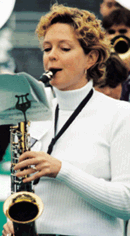
Look Us Up |
Take It from the Top: Calling All Band Lovers A harmonious new alumni group is in the works. "Having a special, all-inclusive band alumni association was John's dream," says Marietta Paynter, widow of the late John Paynter (Mu50, GMu51), who was director of bands from 1953 until his death in 1996. "Every summer, John would send a letter to thousands of NUMB Alums - former members of the Northwestern University Marching Band - inviting them back for Homecoming." And each year at Homecoming, dozens of NUMB Alums return to campus to play in the Homecoming parade and at the game. Plans are under way to formally organize this group and go beyond it to recruit members of the other Northwestern bands - the basketball band, the symphonic band, the concert band and the symphonic wind ensemble - as well as all band supporters, everywhere. "Our goal is to involve as many people as possible who have been active in any of the Northwestern bands in the past," says Mallory Thompson (Mu79, GMu80), current director of bands and professor of music. "The organization will be an expansion of the group that's already informally established." "I know John would be proud of this effort to involve all the bands," says Ed Swanson (S59, GS60), who was an announcer for the concert band and the NUMB. He recalls the feeling of pride when he accompanied the concert band and Paynter in the late 1950s to Paynter's hometown in Mineral Point, Wis., to dedicate the community's new performance center. "All the Northwestern bands were filled with pride and school spirit," he says. "We want the organization to be all-inclusive," concurs Pete Friedmann (S79). All Northwestern bands allow anyone who qualifies musically to join; majoring in music is not required. Although the band alumni organization will not be entirely new, "it's putting an old organization into formal being," says Hal Abrahamson (EB39). "It's about time it put on its tuxedo and became a formal thing instead of an offshoot of Homecoming." A steering committee recruited by Bernard Dobroski (GMu81), dean of music, is working on membership, publicity, programs and bylaws. A questionnaire sent to all band alumni in the fall received an enthusiastic response. "There's already a huge interest," says Dave Weiner (WCAS80), a member of the committee. "We received 300 responses to the first mailing...that's a lot of responses. We're currently drafting the bylaws, and so far we have a three-part mission statement: to provide fellowship among band alumni; to provide enrichment opportunities for band alumni; and to support and advocate for the Northwestern University band program." The group hopes to relieve the University's band staff of the burden of planning for Homecoming each year with limited resources, says Don Hassler (Mu50), another member of the committee. Also, "I think we would like the organization to include other performance activities beyond playing in the parade and at the game," he says. "It's a great step in the right direction." The current NUMB Alums became active in 1972, remembers Abrahamson. "It was altogether different back when I was in the band. There were no women!" he says. "It's a very diverse group now...there is lots of enthusiasm and energy." "I think this whole thing has been a tribute to John Paynter and [Glenn] Cliffe 'Rusty' Bainum [Northwestern's first director of bands]," says Abrahamson. "Their influence has been very important in many people's lives." Hassler recalls the glory days of Northwestern's first Rose Bowl appearance. "I'm a NUMB Alum and also a '49er, a special group of old guys who went to the first Rose Bowl in 1949," he says. "We just celebrated the 50th anniversary of that winning season this fall when 13 of us returned to Homecoming and were introduced at the game. The '49ers have lots to remember, including our three-day enforced vacation in Cheyenne [Wyo.] on the return trip during a blizzard." "Lots of the energy of the band alums was channeled directly through John Paynter, the second of only three band directors in Northwestern's history," says Weiner. "The bands were under his direction for half a century. Now we have Mallory Thompson, who will be around for a long time, too. Mallory has an intense interest in promoting this group and the University. We can go anywhere our interests take us." To find out more about the band alumni association, contact Catherine Stembridge at 1-800-NU-ALUMS or c-stembridge@northwestern.edu. |
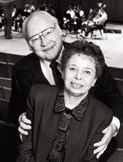
"The School of Music at Northwestern is one of the few schools I know of at which the athletic bands are part of the total music program rather than being housed in the athletic office.
I believe very strongly in
supporting the sports bands as part of the total band organization. It is gratifying to see John Paynter's special vision fulfilled and embraced within the alumni association." |
Melodies, Memories Marietta Paynter is keeping alive the musical heritage of her husband and Cliffe Bainum. Marietta Paynter is the symbolic link to the musical tradition of Glenn Cliffe Bainum and John Paynter, says Bruce Paynter (WCAS73, L76), who, as the Paynters' son, knows a thing or two about the topic. Both John Paynter and Bainum "made Northwestern University synonymous with excellence and accomplishment among the bands of America," he says. His mother still has boxes of books, musical scores and photographs belonging to both band directors, and she plans to donate them to the School of Music to establish a resource center for graduate students in Regenstein Hall. The unofficial scribe of the Northwestern bands, Marietta Paynter carries their history in an encyclopedic memory and supports the University in many other ways. A member of the N Club and Northwestern Gridiron Network, Paynter is a vocal fan of NU sports, boasting a record of 100 percent attendance at home football games since 1951. She is an officer of the not-for-profit John P. Paynter Foundation, established the day after his death in 1996, which provides financial support for the causes of music education, community bands and good music everywhere. The foundation gave four partial scholarships last year to "cherubs" in the National High School Music Institute. "John had planned to set up a foundation in retirement," she says. "John's goal had been to someday return to Pasadena [Calif.] for a Northwestern appearance in the Rose Bowl - and he did, 47 years after traveling there as a Northwestern student and Wildcat Marching Band member," Paynter says. "For the 1996 Rose Bowl appearance, he wrote an arrangement of Everything's Coming Up Roses. And at the pep rally, he wore the T-shirt the team gave him after [former running back] Darnell Autrey ran into him on the sidelines during the Michigan game." She laughs when recalling special moments as she watched her husband conduct, sitting on the sidelines at a football game or in the orchestra pit knitting baby caps during Waa-Mu rehearsals. Although not an alumna of Northwestern, she claims a right to membership. "So, do you think I've got a little purple [in me]?" she asks. |
|
NAA Calendar
May
2 John Evans Club:
June 18 141st Commencement: 6 p.m., Ryan Field 19 Class of 1939, 60th reunion; Classes of 1943-45, 55th reunion 19 Half-Century Club: 11 a.m. luncheon, Norris University Center
September
October 21-22 Council of One Hundred |

Club News On Dec. 3, the John Evans Club held a reception and tour at the Field Museum in Chicago. The club viewed two exhibits, "China's Feathered Dinosaurs" and "The Art of the Motorcycle," and saw the preparation of the fossilized remains of Sue, the museum's 67 million-year-old Tyrannosaurus rex. John W. McCarter Jr., president and chief executive of the museum, discussed the acquisition of Sue. Judith Stofer Block (S63), University trustee and chair of the museum's board of trustees, sponsored the event. A Nov. 13 cocktail party in Tucson, co-sponsored by the NU Club of Tucson in association with the NU Club of Phoenix and the Notre Dame Alumni Club of Tucson, raised a generous sum to support the Ara Parseghian Medical Research Foundation. The foundation supports research to treat and cure Type C Niemann-Pick disease, a neurodegenerative condition that claimed the life of Parseghian's grandson, Michael, and threatens the lives of Michael's sisters, Marcia and Christa. The Medill Club of Greater New York hosted a back-to-school picnic in Central Park on Sept. 12 for current Medill juniors and seniors, local alumni, friends and family. The club hosts happy hours on the first Tuesday of every month at Manhattan's Ye Olde Tripple Inn. On Oct. 21 and Nov. 18, the Medill Club joined the Kellogg Club for a two-part workshop. The first featured a panel of Medill alumni who gave the Kellogg graduates tips on dealing with the news media. At the second workshop, a panel of Kellogg alumni taught Medill graduates how to read a financial statement. The Kellogg Alumni Club of Cleveland held a get-together at the Diamond Back Brewery on Sept. 17. The NU Club of Cleveland toured the RainForest at Cleveland Metroparks Zoo on Jan. 13 and followed the tour with dinner. Last spring, the busy NU Club of (Washington) D.C. celebrated Christmas in April, playing its part in a longstanding national volunteer campaign to repair homes, schools, housing for the homeless and other facilities. As in past years, the local effort was led by Phil Graham (McC60), the community service chair. A similar project is slated for this year. In October, more than 100 alumni, student interns from Northwestern and others attended a panel discussion on the midterm elections, led by Ken Bode, dean of the Medill School of Journalism, with participation from journalists Jay Branegan (GJ73) of Time magazine; Kwame Holman (GJ82) of PBS' The News Hour with Jim Lehrer; Brooks Jackson (J64, Nav64) of CNN; and Susan Page (J73) of USA Today. On Nov. 13, several club members received a special guided tour of the National Archives. And on Dec. 10 and 19, the group was treated to special tours of the White House arranged through the offices of U.S. reps. Jim Kolbe, R-Ariz. (WCAS65) and John Porter, R-Ill. (EB57). On Sept. 24, the NU Club of Rockford hosted a Big Ten Kickoff at Forest Hills Country Club with representatives from nine of the 11 Big Ten schools and alumni clubs attending. Fred Hemke, associate dean of the School of Music and Northwestern's representative to the NCAA, spoke about changes in the conference. On Oct. 11, the club organized its 13th annual Head of the Rock Regatta, a crewing competition with more than 1,300 participants including the University's crew teams. The NU Club of Atlanta gathered at Turner Field on July 18 to watch the Chicago Cubs battle the Atlanta Braves in a game that matched up star pitchers Greg Maddux and Kerry Wood. The NU Club of Naples (Fla.) invited Bernard Dobroski, dean of the School of Music, and two music students on Nov. 5 to the Naples Beach Club Hotel for dinner and an evening of musical entertainment. More than 80 members attended. |
 |
|
| Nota Bene . . . The annual meeting of the Northwestern Alumni Association will be held on Oct. 1.
|
Open Homes, Open Hearts Evans Club members share hospitality and memories of international students. Even for many American-born students, the Northwestern campuses, located in the midst of a huge metropolitan area, can be bewildering places at first. But that disorientation is greatly magnified for many of the approximately 2,000 students from 98 countries who study at Northwestern every academic year. Since the early 1970s, the Community Council for International Students and members of the John Evans Club have tried to ensure these friends from abroad have a home away from home when they come to study at the University. Until the program began, Northwestern had no official arrangements for welcoming foreign students into the Evanston community although many of their other needs were and are addressed by the Office of International Programs and Scholars. In 1971, Margaret Thomson, a newcomer to Evanston, told her friend, Greta Sims (WCAS58), about her wonderful experience hosting a Thai student at Stanford University. Sims, who is a member of the John Evans Club, and Thomson spoke with University officials, offering their time and their homes. With Northwestern backing, the two women asked their friends to be "homestay hosts," thus forming a network of charter members of what would become CCIS. Many members of the John Evans Club became involved with CCIS and continue their involvement today. In the beginning, 50 families offered to give temporary housing to international students during their searches for permanent lodging in Evanston. Other local residents volunteered to be foster relatives, inviting students throughout the year to holiday celebrations, sports outings, concerts or just drop-ins for a chat. "CCIS provides a cushion for these students and helps them find decent housing," says Greta Sims' husband, Ron Sims (S58). "As hosts, we also benefit from incorporating them into our lives and our adventures. A French student sailed with me on the Chicago-to-Mackinac race, and two German students were with us when the Berlin Wall came down." Many homestay hosts keep in touch with these students for years afterward. Mary Whiteside Schuette (WCAS60) still writes or visits the students from the Republic of China (Taiwan) and the People's Republic of China who carved jack o' lanterns in her basement one Halloween years back. "I'd like to think I'm helping international relations," she says. Becoming involved with international students at Northwestern is not limited to members of the John Evans Club. Those who wish to volunteer their time or their home may call Greta Sims at 847-328-7394. |
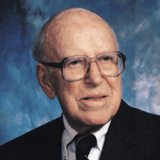
A Life Worth Noting At age 3, Norman Goodbrod (GMu35) began hunting for and pecking out tunes on the piano after hearing his mother play. "I had a natural affinity for the instrument," recalls the musician, who celebrated his 99th birthday last August at the Mayflower Home in Grinnell, Iowa. "I would play all the black keys because I liked them best. They caught me once walking across all the black keys!" Goodbrod's parents, who were born in Germany, bought a 25-acre farm at the turn of the century near Utica, Neb., about 40 miles from Lincoln, where they raised horses and reared their eight children. Being around horses and music from an early age left Goodbrod with a lifelong passion for both. As an undergraduate at the University of Nebraska, Goodbrod initially pursued medicine, but he switched majors after he took second place in a music competition. Earning graduate degrees from Northwestern and the Juilliard School of Music, he spent summers in the Palace Fontainebleau in France under such well-known musicians as Isidore Philipp and Cécile Casadesus. "I could sight-read music, accompanying others with no practice, and that always surprised people," Goodbrod says. He recalls his Northwestern graduate days fondly. At the same time, he and other students were mindful that it was a tough world out there during the Great Depression. In the year of Goodbrod's graduation, the tuition for music majors was capped at $200 per semester, including lessons. Goodbrod met his wife, Harriet, while he served as organist for her Nebraska chorus. She later became the associate dean of women at Grinnell College, where Goodbrod taught for 28 years. One Goodbrod student who made a distinct impression was jazz great Herbie Hancock. "I did not teach him jazz myself, but I did provide him with a good technical foundation in music," Goodbrod says with satisfaction. After a 1996 Grinnell concert, Hancock spotted his former music instructor and asked if he had made any mistakes. "Only two!" replied the teacher. On the equestrian front, Goodbrod recently received an Iowa State Fair Award for promoting American Saddlebred horses. In local shows, he was a common sight for years mounted on his beloved Sunny Stonewall. "My daughter [Gretchen Johnson] did more riding in shows than I did, but I supported her in them anyway," he jokes. While conceding that his years thus far have been eventful and fullfilling, he does so with typical Midwestern understatement. "I have been known as a good-natured, friendly person who can provide people with musical accompaniment," Goodbrod says. - Kate MacLean (WCAS02) | |
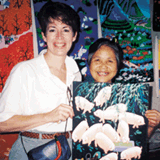
Bridge to Baoji "If you eat a long noodle, then you're supposed to live a long life," she explains. "These are three- or four-foot noodles!" Luckily for her, slurping is both acceptable and encouraged. In August 1997, Folz, now director of technology alliances in the Chicago office of Andersen Consulting, spent three weeks in China with four other American women. She taught basic English to young teens in Baoji, an industrial city located in northern China's Shaanxi Province. The contingent was there through Global Volunteers, a St. Paul-based nonprofit organization that promotes international peace through mutual understanding by volunteering. Folz has high praise for the organization. Most people outside China haven't heard of Baoji, but, surprisingly, the city has 3.3 million people and 14 factories. According to Folz, each factory is really a little community unto itself. Life in each one has a small-town feel, and the volunteers were made to feel warmly welcomed. Folz taught conversational American English to an enthusiastic group of students at the Baoji Railway Bridge Middle School. In the classroom, America was a frequent topic, with her pupils taking every opportunity to soak up information on the country. "Whenever we had a study break, they would crowd near me and just listen," she says. "The school principal and other teachers would join in as well, and in return they would try and teach us a few phrases in Chinese." Only a few people had ever seen a non-Chinese person. "A couple of times we went to the fresh produce market and naturally we stood out," she says. "The people would cluster very closely around us even though they didn't understand a word we were saying. Buying fruit was eventually accomplished through lots of gesturing and pointing. We must have provided a good story for the dinner table that evening." Another opportunity to spend time with local residents came when the party secretary of the railroad bridge factory invited the volunteers to a dinner party at his home, a small, two-bedroom, factory-issued apartment where he lived with his wife and son. After dinner, the group crowded around the television to watch the local news, which featured the arrival of the Global Volunteers. "Through an interpreter, we were also interviewed by newspaper and radio reporters," Folz says. "We were honored guests, if not minor celebrities, everywhere we went. I know we made an impact. I hope we made a difference." - Sarah Bellows (WCAS01) | |
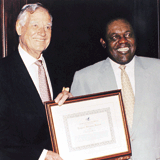
Our Man in the Bahamas In 1996, Moore was named an Honorary Commander of the British Empire, one of the United Kingdom's highest recognitions, for his efforts to educate Bahamian students abroad. Each year, the foundation gives away more than $1 million in scholarships so high school seniors and graduate students can study in the United States or other countries. Moore "has probably had more impact on the betterment of the Bahamas than any other American who has ever lived here," says C.A. Smith, the country's minister of tourism. Recently, the foundation pledged to raise $5 million in five years to fund scholarships to the College of the Bahamas in Nassau. When this commitment is fulfilled, more than 500 students will be studying in the Bahamas or abroad yearly. Already, $3 million has been raised. Moore started vacationing in Lyford Cay 23 years ago when he was president of the Beloit (Wis.) Corp., which manufactures papermaking equipment. After retiring in 1983, he bought a house in the Bahamas and became a permanent resident. From early on, this transplanted American was not shy about asking people for money. As a marketer with Beloit, he sold machinery worldwide. He also ran a drive for a new hospital in the town. "I like to separate people from their money," he says. Today, Moore spends about 10 months in the Bahamas and two months in Beloit. When he is not working, he walks four miles a day with his wife, plays golf and reads. He has seven children, 11 grandchildren and five great-grandchildren. At Northwestern, where he majored in English composition, Moore was a member of the Phi Kappa Psi fraternity. "I wasn't much of a big shot there, but I made a lot of friends," he says. Two of his children also attended the University. As a result of his activities, Moore has become something of a celebrity in the Bahamas. He has been a guest at the governor general's house and was invited to the wedding of the prime minister's daughter. And Moore still has big goals for the foundation. "Give us 10 years and the prime minister will be one of our alums," he says. -Liza Berger (WCAS97 | |
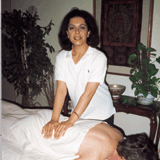
Rubbing Others the Right Way DeSouki, who is a licensed massage therapist, opened her own business, Wellness on Wheels for Seniors, in Los Angeles after more than 14 years as an executive in mainstream health care. "I was pretty well entrenched in the health care industry here and internationally," says DeSouki, who also has a master's degree in health services administration from George Washington University. But then "I realized there was a new trend toward alternative medicine so I used my management and health care experience and developed my own business, which is what I've always wanted to do." DeSouki not only had the business savvy to invest in a burgeoning field, she also decided to tap into an often ignored but large customer base - the elderly. "Not many people specialize in geriatric massage. They have a fear of touching this fragile community," she says. "Ninety percent of my patient population is over the age of 65, up to the age of 101." Although conventional practitioners have been the hardest ones to convince, DeSouki - who also lectures about geriatric massage at retirement and senior centers, hospitals and support groups - notes that alternative methods such as massage are being integrated into mainstream treatments for patients. "Massage allows for better circulation and alleviates pain, so a person might not use as much pain medication after surgery," she says. "Some physicians recommend massage as a follow-up to continue treatment when physical therapy is not medically necessary or is no longer covered by insurance." In addition to owning her own business, the busy DeSouki also works as an Arabic interpreter. An Egyptian American who grew up in the United States, she maintained her native language and studied Arabic at Northwestern. "I get calls when a physician needs an interpreter for a patient," she says. But DeSouki has no intention of abandoning her business, which she finds personally and financially rewarding. "[Working with the elderly] is like having many grandmothers and grandfathers. You learn from them," she says. "There's nothing more rewarding than getting a hug and a kiss when your client gets off the table. It's the most gratifying and fulfilling professional experience." - Cherise Bathersfield (J99) | |

Taking the Purple to Paradise, aka Hawaii Rain forests, mountains with waterfalls, pristine beaches and Haleakala, a dormant volcano, were just a few of the sights that welcomed 76 alumni as we started our NAA Hawaiian holiday in Maui. Our hotel was the Hyatt Regency, a luxurious location on Kaanapali Beach. It was like living in a tropical garden, with beautiful plantings, wild birds and statuary everywhere. To no one's suprise, we saw several weddings in this idyllic spot. In the ponds were colorful koi fish, waiting to be fed. Each sunset, a torch-lighting ceremony ushered in the evening. Dining in the Hyatt's Swan Court was a special treat, with the beautiful waterfowl actually swimming up to the table for tidbits. The abundance of activities available at the hotel turned loafing into a sin. Two pools, an exciting water slide and, of course, the ocean enticed the aquatically inclined. Bicycle tours and helicopter rides took us to a variety of island sights, and every day was delightfully warm and sunny punctuated by short bursts of sprinkles. A short drive from the hotel is the town of Lahaina, the rustic former royal capital, now gentrified for the abundant tourist traffic. The Bubba Gump Shrimp Company, a new chain restaurant filled with colorful artifacts from the movie Forrest Gump, is a popular hangout. Farther up the coast is the Kapalua resort area with its well-known Kapalua Golf Club Plantation Course. Much too soon, it was time to leave Maui for the bustle of Waikiki Beach and the Hilton Hawaiian Village, both on the most heavily populated island of Oahu. While there, many tour participants opted for excursions to the Polynesian Cultural Center, Pearl Harbor, the USS Arizona Memorial, Waimea Falls or Hanauma Bay, a snorkler's paradise. A reception for President Henry S. Bienen and Leigh Buchanan Bienen sponsored by the NU Club of Hawaii drew a crowd of 275 of the more than 700 alumni who live in Hawaii. Club President Harold Chu (L74) welcomed the guests and Hawaiian Alumni Regent Carl Haga (WCAS59, D64, GD66) introduced President Bienen. The evening concluded with an unexpected fireworks display that is a regular feature on the islands. Finally, Saturday came and with it the big event: the Northwestern Wildcats against the University of Hawaii Rainbows. It began with a tailgate party attended by 450 enthusiastic alumni, friends and students and included cheerleaders and a pep band. The rain held off until game's end and a 47-21 Northwestern victory, a fitting finale to our tour and an upbeat ending to an otherwise disappointing football season. The next day, the Purple returned from paradise on a long red-eye plane ride. As our tired party waited at O'Hare International Airport's baggage claim area at 5 a.m., who should arrive but the Wildcat football team? They were equally tired but satisfied that their mission was accomplished. Gary Barnett, then Northwestern's head football coach, and his wife, Mary, greeted us with happy smiles. Then, we all went our separate ways, bidding each other "Aloha." Dan (J50) and Bonnie Kistner (S50) Wefler, who took the Hawaiian Football Holiday last November, live in Evanston. | |
|
Be a Part of History Northwestern's Sesquicentennial needs your memories. Go through your attics and photo albums in search of memorabilia from your Northwestern days. Then send us the best items! In preparation for its sesquicentennial celebration, Northwestern is preparing a book and a video on the last 150 years. It might be a picture of your roommate during a 1957 panty raid, old movies of your mother at a formal with Warren Beatty (S59), your great-uncle's class photo, your old letter sweater or dance card or freshman letters home to your parents. If you think it's a good piece of history, we'd like to borrow it, and you might see it in the official Sesquicentennial book or video. Photos, souvenirs and home movies of Northwestern people, places and events can be worth far more than a thousand words. If you have a photo, home movie or piece of memorabilia that you think would be a good contribution to the book or movie project, please let us know. Please call or send a brief description of your memento to Monica Metzler, Sesquicentennial director, Northwestern University, 555 Clark St., Evanston, Ill. 60208-2376; e-mail: m-metzler@northwestern.edu; telephone 847-467-7241. Include your return address. All materials will be returned.
| |
|
Alumni Survey Sets Priorities So whaddya think? Northwestern alumni have had the opportunity to answer that question in great detail this year. The Northwestern Alumni Association board of directors commissioned a comprehensive survey of alumni this spring to help establish priorities for the future. The telephone survey asked alumni for their opinions on alumni communications, on-campus activities, club events and a variety of other topics. The results reflect those opinions from a random sample of alumni. "The survey gives us insight into what our alumni are interested in and what kinds of activities they prefer," says M. Catherine Jaros (GSM73), NAA president. "The information we've received will help us determine what we want to focus on in the coming years." Results of the survey will be detailed in an upcoming issue of Northwestern magazine.
| |
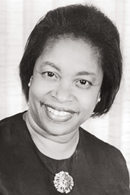 |
Margaret Walker Alexander
She chronicled the black experience in poems, stories and novels.
Margaret Walker Alexander (WCAS35, H70), 83, of Jackson, Miss., Nov. 30. Born in Birmingham, Ala., to a minister who was educated at Northwestern, she transformed her experiences as a black woman in the deep South into poignant stories, poems and a best-selling novel, Jubilee. Published in 1966, the book told the story of the daughter of a slave and a white plantation owner. Ms. Alexander entered Northwestern at age 15. In 1942, she became the first African American writer to win the Yale Series of Younger Poets competition for the poem For My People. Ms. Alexander taught at Mississippi's Jackson State University, where she founded the Institute for the Study of the History, Life and Culture of Black People in 1968. She served as its director for 11 years, and the center was later renamed in her honor. "Margaret Walker Alexander was a woman for all seasons," said Clarence Hunter, an archivist at Tougaloo College in Mississippi. "She was a poet, a novelist, a teacher, a mentor, a scholar, a humanitarian, an activist, a fighter for the rights of people. She was everything you can expect of a great woman." Survivors include her daughters, Marion Colmon and Margaret Williams; her sons, Firnist and Sigismund Alexander; and nine grandchildren. |
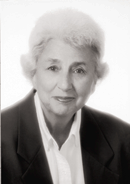 |
Joan Wagner Beck
A pioneer woman journalist, she advanced her career with
determination and talent.
Joan Wagner Beck (J45, GJ47), 75, of Lake Forest, Ill., Dec. 10. A native of Clinton, Iowa, Ms. Beck joined the Chicago Tribune in 1950, one of the few women in the newsroom at that time. Eschewing the traditional beats of female reporters, fashion, cooking and beauty, she delved into social issues such as adoption, education, foster care and women in the work force. Trailblazing came early to her. She was the first woman to serve as top editor of the Daily Northwestern. In 1961, Ms. Beck took over the Tribune's popular nationally syndicated "You and Your Child" column. In 1972, she was promoted to daily features editor and soon after became the first woman to serve on the editorial board. In 1984, she was honored by the American Society of Newspaper Editors and was inducted into the Medill School of Journalism's Hall of Achievement in 1997. "Joan Beck wore the Northwestern purple and white with dignity and class," said Roger C. Boye, assistant Medill dean and associate professor of journalism, at a December memorial service. In particular, he added, she valued her experience in Medill's "cherub" program, a summer institute for high school journalists that she later supported with her time and energy. Preceded in death by her husband, Ernest, she is survived by her daughter, Melinda Beck Neger; a son, Christopher; a sister, Carol Hallenbeck (J49); brother-in-law Bruce E. Hallenbeck (J50); and two granddaughters. |
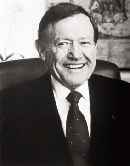 |
Jay Pritzker
Billionaire with a heart gave enormous sums to charities.
Jay Arthur Pritzker (EB41, L47), 76, of Chicago, Jan. 23. One of the richest men in the country, he was also one of the most generous, donating millions of dollars to an impressive array of philanthropies. Although Mr. Pritzker and his family have had major interests in dozens of concerns, he is perhaps best known for building the Hyatt Hotels Corp. chain into one of the world's largest. Excluding his family, Mr. Pritzker's personal fortune was estimated to be $5 billion. Favored charity recipients included the Lincoln Park Zoo, the Chicago Public Library Foundation and the Boys and Girls Clubs. Probably the most visible project supported by him and his family is the prestigious Pritzker Architectural Prize. "Jay Pritzker [was] a brilliant businessman who...put together deals that...earned him enormous wealth, but he also [recognized] an obligation to give back," said Steven Nasatir, president of the Jewish Federation of Metropolitan Chicago, to the Chicago Sun-Times. Mr. Pritzker was preceded in death by his daughter, Nancy, and his brother, Don. He is survived by his wife, Marian ("Cindy"); four children, Thomas, John, Daniel and GiGi; his brother, Robert; and 13 grandchildren.
|